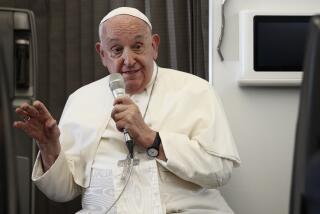Opinion: Pope Francis and the ‘gospel’ of election reform
- Share via
The other night a journalist friend who writes a lot about religion tweeted out a comment Pope Francis made about ... political campaign spending. “In the financing of electoral campaigns,” the pope said, “many interests get into the mix, and then they send you the bill.”
I replied: “So does this mean he’ll excommunicate the five Catholic Supreme Court justices who voted for Citizens United?”
I was kidding -- but only to a point.
Even if Pope Francis weren’t known for his tolerance of differing views, he’d be unlikely to unchurch John G. Roberts Jr., Anthony M. Kennedy, Antonin Scalia, Clarence Thomas and Samuel A. Alito Jr. for disagreeing with him about money and politics. Previous popes hurled no anathemas at Kennedy and William Brennan for ruling in favor of abortion rights, an issue much more central to Catholic moral theology.
Also, even as some more conservative Catholic bishops have advocated denying Holy Communion to pro-choice members of Congress, they mostly seem willing to give Catholic judges a pass, a paradoxical phenomenon I wrote about here.
Nevertheless, the pope’s foray into the proper functioning of election campaigns made news -- and served as fodder for jokes -- because it evoked two familiar themes.
The first is the enthusiasm of Catholics who are political liberals to revere papal pronouncements when they track their own politics. Thus, liberal Catholics cheered when Francis deplored “trickle-down theories which assume that economic growth, encouraged by a free market, will inevitably succeed in bringing about greater justice and inclusiveness in the world.”
Conservative Catholics have the opposite reaction, a position known as “Mater Si, Magistra No” after the headline on an article reacting negatively to Pope John XXIII’s 1961 encyclical “Mater et Magistra” (“Mother and Teacher”), which contained some comments about economics that the conservatives found unpalatable. (The pope wrote that “private ownership of property, including that of productive goods, is a natural right which the state cannot suppress. But it naturally entails a social obligation as well. It is a right which must be exercised not only for one’s own personal benefit but also for the benefit of others.”)
But there is another context that explains both why papal endorsement of political ideas pleases Catholics who share those ideas and why non-Catholics find papal punditry problematic.
Although Francis is an unusually collegial and tolerant pope, it remains true that the Roman Catholic Church -- compared with other Christian bodies -- is a hierarchical organization. Historically, Protestants and others (including secular liberals) in this country worried that the Vatican and its representatives would dictate how Catholic public officials would act.
That anxiety explains John F. Kennedy’s legendary 1960 speech to a group of Protestant ministers in Houston in which he said: “I believe in an America where the separation of church and state is absolute; where no Catholic prelate would tell the president -- should he be Catholic -- how to act, and no Protestant minister would tell his parishioners for whom to vote.”
In recent years JFK’s strict separationism has come in for criticism from Catholics who think it conceded too much. In 2010, Archbishop Charles J. Chaput of Denver (now the archbishop of Philadelphia) had a different message for an audience in Houston: Kennedy’s speech had “profoundly undermined the place not just of Catholics but of all religious believers in America’s public life.”
But Kennedy’s speech is still cited as a sacred text in American civil religion, and it’s a useful proof text for American Catholics when confronted with questions about whether they must conform their political activity to the wishes of “Mother and Teacher.” (Don’t think such suspicions are obsolete. Some liberal conspiratorialists believe that “anti-woman” decisions such as Hobby Lobby can be explained by the concentration of devout Catholics on the court.)
So it would probably be wise for gleeful Catholics who despise Citizens United or support public financing of election campaigns not to suggest that the justices who were in the majority in that decision are bad Catholics. If the pope’s views about abortion are irrelevant to the deliberations of the court, so are his views about spending on elections.
Follow Michael McGough on Twitter @MichaelMcGough3
More to Read
A cure for the common opinion
Get thought-provoking perspectives with our weekly newsletter.
You may occasionally receive promotional content from the Los Angeles Times.











